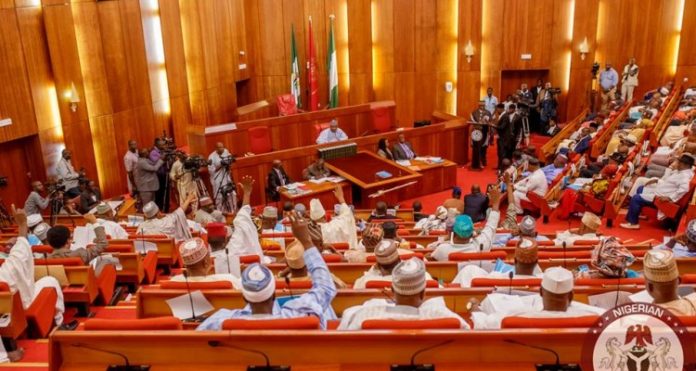The Senate on Tuesday considered a bill seeking to improve credit repayment culture, reduce non-performing loans in the banking sector, streamline loan recovery watch-list consistent loan defaulters with the view to track and blacklist them.
The bill which scaled second reading was referred by the Deputy Senate President, Ovie Omo-Agege, who presided over plenary, to the Committee on Banking, Insurance and Other Financial Institutions for further legislative work.
Sponsor of the piece of legislation, Senator Mohammed Sani Musa (APC – Niger East), in his lead debate noted that “the core of the financial system of any country are the commercial banks, because they have the potential to apply the full weight of their credit facilities for the development and growth of the country’s economy.”
According to the lawmaker, “credit is seen as the blood stream of the banking business”, adding that, “the situation in Nigeria demands an injection of a healthy bank credit and recovery system that will effectively fasten the pace of growth.”
Musa, however, explained that the need for the introduction of the bill was intended to insulate commercial banks and financial institutions from “bad borrowers” that constantly default on loan repayment.
“Before the deregulation of our banking system, the ability of our banks to recover loans has been the bedrock behind the collapse of many commercial banks with a dire consequence to many innocent account holders, which have resulted in collapse of their businesses, loss of savings and even death.
“In many instances, most economies have consequently experienced high level and increasing rates of unemployment as a result of such negligence’s of the credit system.
“Today, the situation in Nigeria has become very serious and seemingly intractable and thereby frustrate our effort as a nation toward private driven economy as well as economic diversification and growth.
“In light of the above, there is only one obvious option left for any country where policy measures failed, which is to urgently enact legislation that will address the problems once and for all,” the lawmaker said.
Meanwhile, the Upper Chamber also on Tuesday considered two bills seeking to establish the Nigerian French Language Village; and the Federal University of Ankpa, Kogi State.
Both bills which scaled second reading are sponsored by Senator Olamilekan Solomon Adeola (APC – Lagos West); and Senator Jibrin Isah (APC – Kogi East).
Leading debate for the establishment of the Nigeria French Language Village, sponsor of the bill, Senator Adeola noted that the village provides the mandatory year-long Language Immersion Programme for all undergraduates of French Language Studies in Nigerian Universities and Colleges of Education.
According to him, the village which has been an active teaching, research, learning, immersion and acculturation Centre, will receive legal backing with the passage of the bill into law by the National Assembly.
The Deputy Senate President, Ovie Omo-Agege, after both bills were considered by the Upper Chamber, referred them to the Committee on Tertiary Institutions and TETFUND for further legislative work.
The Committee which is Chaired by Senator Ahmad Baba Kaita, is expected to report back in four weeks.

Call:
Sandra - 07069148333
Pauline - 08174374150
Scholastica - 09060678434













